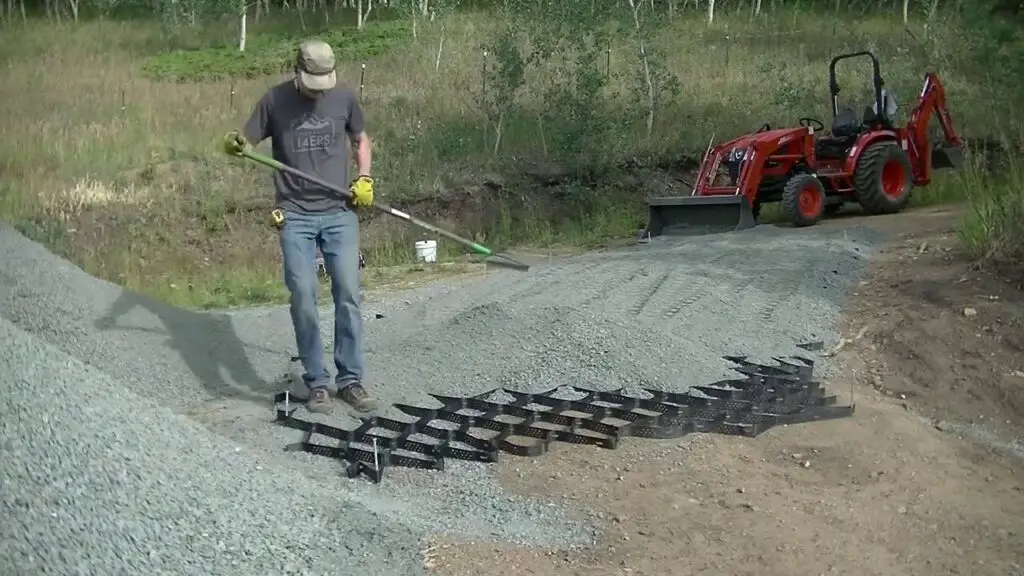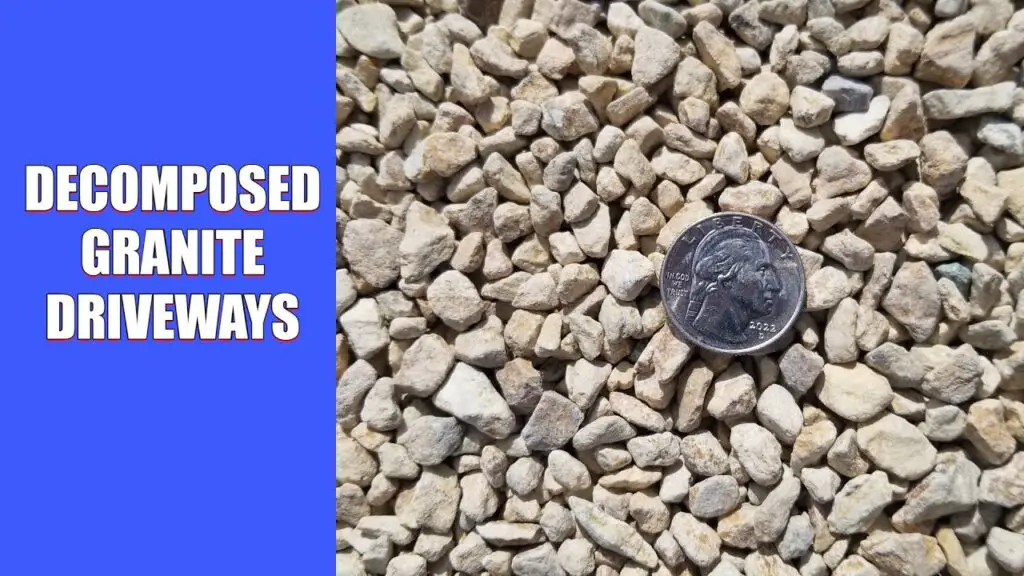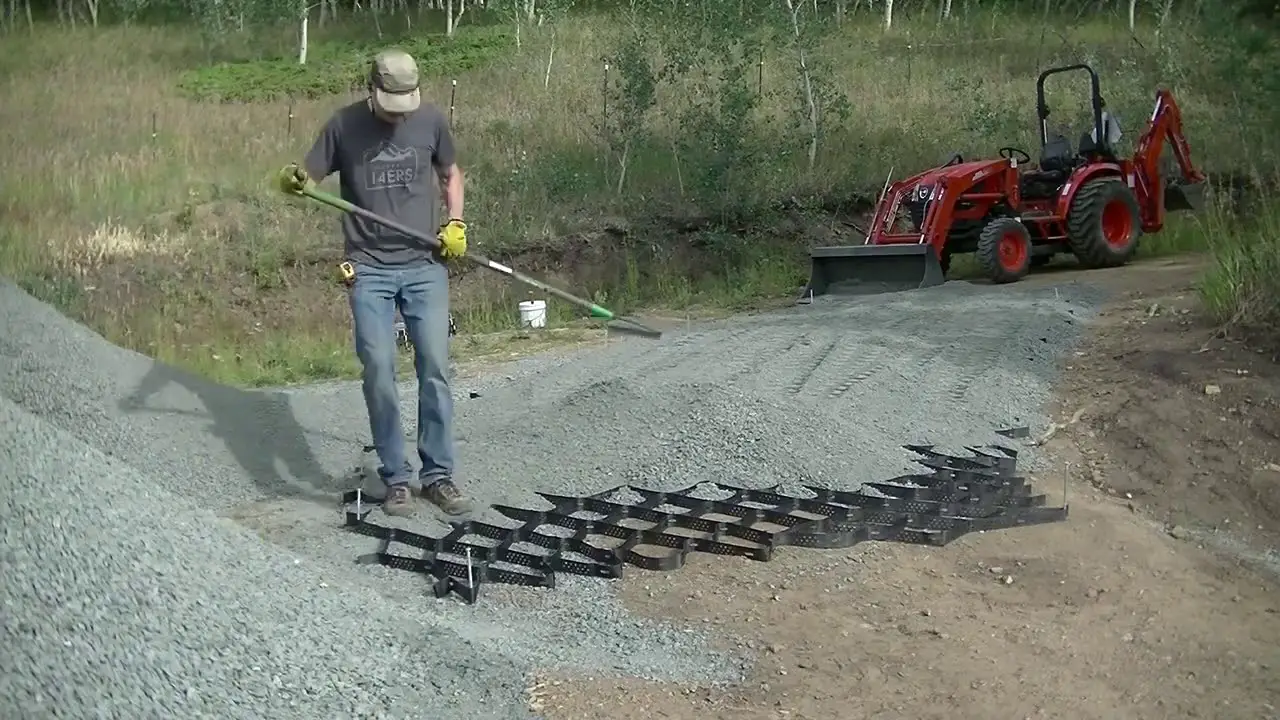The best size for gravel driveway is 14mm and 20 mm. The gravel size within this range will help to achieve a stable and safe driveway. Large size gravels than 20 mm will be damaging to the vehicles and will also be difficult to walk on. The best gravels are granite, crusher run, and small pea gravel.
Choosing gravel size for different layers of driveway – base, middle, and top layer require careful consideration of the purpose, slope of driveway, and the method of laying. So, it’s important that you not just choose the best size but also follow the correct method of layering and laying the gravels.
So, continue reading the article as it has got plenty of useful insights that will help you choose the appropriate type and size of gravel that will fit your budget.

Gravel for driveway – but why?
Gravel has also been a popular choice among homeowners for driveway. It is cost-effective, durable, and easy-to-manage solution for most applications. But it’s critical to choose the right size of gravel. With the wrong size, you’ll not just face problems while using the driveway but can also impact the outdoor appearance of your home.
Also Read: Is crushed Concrete Better than a gravel driveway?
What size of gravel is best for my driveway?
A lot of homeowners are mistaken that the gravel size you’ll put for some footing layer or other landscape feature also works best for driveways. But it’s not that simple. Driveways have specific needs and you need to choose a well-blended gravel size that’ll give you stable and firm base. That’s why as a professional Contractor, I have always recommended homeowners to use different layers of gravel with blend or mixture of at least three different sizes.
For most of my projects, here’re the layers I’ve always tried to follow:
Foundation Layer
It’s the base layer for the driveway and is the most important layer that connects your driveway with the subgrade or the earthen foundation. The best size for base layer is coarser as its main purpose is to take up the loading. The best size for base layer is #1 gravel (4 inches) or 101 mm.
Middle layer
The main purpose for the middle layer is drainage. The middle layer acts like a sandwich layer that helps make your driveway sturdy and avoid muddy situation. Most common size for drainage layer is #5 of 25 mm. It is the same size of gravel that is commonly used in most landscaping jobs.
Like Us on Facebook!
Also Read: Can you lay Stepping Stones on Gravel (Yes & Here’s how to do it)
Subscribe Us on YouTube!
Surfacing layer
The top layer is the surfacing layer. It is the layer on the top that’ll drive on or walk on. The best thing you can do for the surfacing layer is to use mixture of small gravel stone and rock dust. The stone dust has a cementitious properties that help combine all other gravel sizes and join them together. It helps achieve a durable surface. You can choose a color suitable for your driveway that matches with the other hardscape construction in your yard. The best size for surfacing is the #57 and thinner than the middle layer.
Different types of gravels best for driveway
The most common types of gravel for driveways include: all purpose gravel, pea gravel pebbles, river pebbles, decomposed granite, and marble chips. But before you can choose the best type of gravel for driveways its best to consider the availability, budget, and climate in mind.
So, as a pro tip I have added the pros and cons of the all of the above types of gravels so help you choose the best one for your driveway project:
Also Read: Can You Lay Flagstone on Dirt? How to Do it the right Way?
All-Purpose Gravel
Pros:
- Versatility: All-purpose gravel is widely available and suitable for various landscape projects, including driveways.
- Cost-Effectiveness: All-Purpose gravel tends to be one of the more cost-effective solutions when selecting materials for driveways.
- All-purpose gravel is easy to install due to its straightforward process for spreading and leveling it, making installation simpler.
Cons
- Unfortunately, its appearance may not be as attractive compared with some other options available to users.
- Maintenance: Due to its tendency for shifting and scattering, regular replenishment and maintenance may be required to keep it looking its best.

Pea Gravel Pebbles:
Pros
- Aesthetically Pleasing: Small pea gravel pebbles come in an assortment of colors for an attractive yet natural aesthetic appeal.
- Comfortable to Walk On: Pea gravel’s rounded shape makes it more comfortable for walking on than its angular counterpart, and its gaps between pebbles allow for proper water drainage, helping prevent pooling and erosion.
Cons
- Pea gravel offers many advantages when used correctly but may present certain drawbacks depending on its use; such as pooling of water between its layers causing pooling or erosion issues. WARNINGS/CONS
- Mobility: Pea gravel can easily be dislodged when driven over repeatedly, necessitating regular raking and leveling for proper installation.
- Tracking: Due to their small size, pebbles may get lodged in shoes or be tracked into your house or car causing it all sorts of havoc!

River Pebbles
Pros
- Natural beauty: River pebbles boast a smooth and polished surface that adds elegance and nature-inspired design elements to driveways.
- Durability: River pebbles tend to be more resistant to shifting than smaller gravels when it comes to shifting or displacement issues.
Cons
- River pebbles require minimal upkeep once installed properly, reducing costs significantly compared to other gravel options due to their visual appeal. But as their aesthetic value adds more expense than other gravel options.
- Limited Access: River pebbles may be difficult to source depending on where you live, making their use more challenging than other forms of gravel.

Decomposed Granite:
Pros:
- Stability: Decomposed granite has long been known for its exceptional stability and compaction properties that help provide a strong surface suitable for driveways.
- Natural Appearance: Decomposed granite features an earthy and rustic appearance that complements various architectural styles. Permeability:
- Decomposed granite allows water to permeate through, thus minimizing runoff and improving drainage.
Cons
- Decomposed granite may produce unevenness within its surfaces that requires constant care when cleaning or maintenance is performed on it.
- Dust: Decomposed granite may generate dust particles, which could pose health concerns to those with respiratory conditions or living near roadways. Tackling: Indoor tracking may occur easily with decomposed granite flooring – regular cleaning may be required to reduce its spread.
Marble Chips
Pros
- Aesthetically pleasing: Marble chips add a luxurious and sophisticated appearance, adding an air of sophistication and luxury to driveways. Durability: Marble is relatively hard material that resists wear and erosion.
- Low Maintenance Costs: Once properly installed, marble chips require little upkeep or upkeep costs for ongoing care and upkeep.
Cons
- Although marble chips provide many advantages when installed properly in driveways, there may be potential cons associated with their installation process and aftercare requirements.
- Marble chips tend to be more costly compared to other gravel options due to their luxurious aesthetic. Their porous composition also leaves it susceptible to staining from spills, chemicals or oil exposure and other forms of exposure.





















